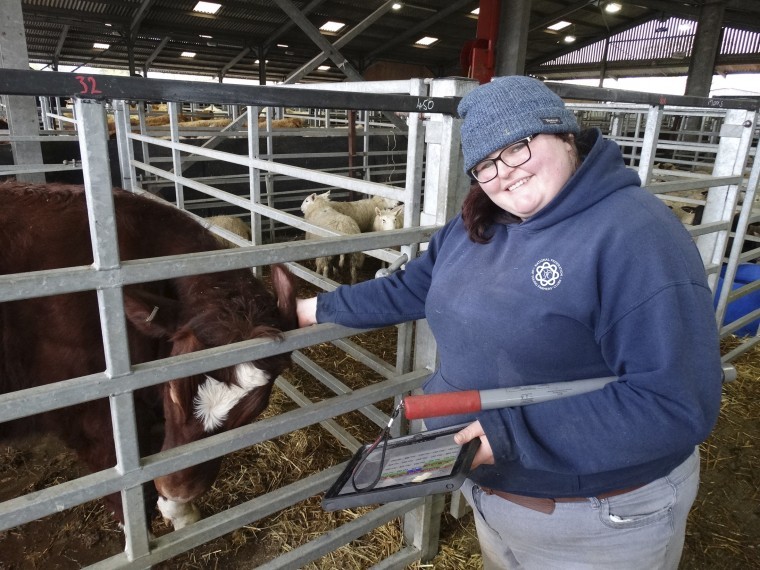Lynsey Martin wants to use her position to encourage more education about food and farming in schools. During her year as chairman she is working with Linking Environment and Farming (LEAF) and Farming and Countryside Education (FACE) on a new initiative to educate young people about how and where their food is produced as well as open their eyes to the number of careers in farming.
A new training module will equip YFC members to give lessons about farming and food production. Working alongside LEAF and FACE regional education consultants, the initiative will be rolled out in schools across England and Wales.
Lynsey is particularly keen to talk to year nine children who will be choosing their GCSEs. Primary school children already have quite a lot of material on the issues, she says, but anything used for the initiative could be adapted for them. In the week leading up to the federation’s annual convention in Blackpool from 4 to 6 May, Lynsey has set a personal challenge to visit a number of schools on the way. She has been given a Honda ATV to take into schools so she can talk to children about career opportunities in the industry.
Lynsey is a self employed livestock worker, which involves spending odd days at markets, relief milking, holiday cover and more. “Next week I’m working with goats for the whole day. I show animals as well, which is when I travel.”
Lynsey, 29, has been a member of Ashford and District Young Farmers’ Club for more than 10 years and was the national vice chairman of NFYFC for two years. Members of the NFYFC council elected Lynsey chairman in February.
She still lives on her family’s mixed farm in Kent. Her uncle is in charge of the farm, and is 90 plus, so he rents a lot of the land out for arable production. There are a few fields which have been permanent pasture since the last war which cannot be used for arable, and where her uncle used to keep a few sheep. As he cannot do that any more, Lynsey keeps some cattle and sheep to graze the different grass species rather than mowing it for hay. “This is about grassland management as much as it is about having some animals. It is also a useful carbon sink.”
Currently, she has 12 ewes and a ram, four of which are forming the basis of her pedigree Texel flock. “I work for a lot of people who have lambing,” Lynsey says. “I pick up their sock lambs if there are any they have not managed to foster off. I keep the ewe lambs and sell the wethers.” There are currently six cattle, plus their followers and some calves which were inside during the third week of February because it was wet. “They alternate with the sheep because it helps with pasture management to have two different species.”
Lynsey says she is “incredibly aware” that she is very lucky. “I have a route into the industry through my family. With land prices and access to finance, it is very hard for others at the moment.” There is also a problem with succession, she says – with people who want to get out of farming but cannot afford to, and people who want to get into the industry but can’t afford it.
She mentions the Fresh Start initiatives which have tried to link up older and younger farmers through share farming or various other ways of getting someone into farming. “It’s still early days and there are not that many matches yet.” There are, of course, other careers linked to the industry which don’t require land and finance – agronomists, vets and seed salesmen, for example. Go even further into the food and processing sectors and there are lots more jobs related to agriculture.
Lynsey intended to make education and farming her theme three years ago when she chaired agriculture and rural issues, one of five steering groups run by the NFYFC. But instead, she and the NFYFC became involved as the dairy crisis hit its members. They teamed up with the NFU and met retailers to try to persuade them to help stop the slide in milk prices.
Back then, she attended a four day Big Bang careers fair at the NEC in Birmingham with Bright Crop, a former careers advisory specialist for the food and farming industries. Massey Ferguson lent a tractor for the event, which was promoting different careers based on science, technology, engineering and mathematics subjects. “The reaction from people at Birmingham made me realise how exciting and innovative the farming industry is. I went to a grammar school, and agriculture was not an academic enough option for someone from that school.” But that misses the innovation in agriculture, says Lynsey, who gives the example of HandsFree Hectare, a project begun by Harper Adams University to grow the first arable crop remotely using automated machines instead of humans. The project is continuing for another year to see if the yield can be improved.




